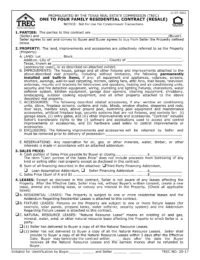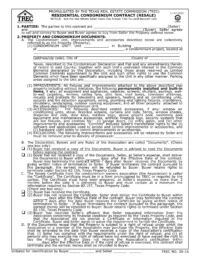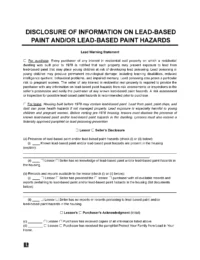A Texas residential purchase agreement is a legally binding contract between a buyer and seller, meticulously detailing every aspect of a property sale. It includes details like the earnest money the buyer deposits upfront and the intricacies of financing and insurance obligations.
Once both parties agree to all terms and conditions and sign the purchase agreement, the deal becomes active and allows for the seamless transfer of property ownership. This document protects both sides’ interests and ensures they adhere to every stipulation, from the closing date to any contingencies.
State Laws
- Buyer Beware: The seller is required to reveal all material deflects to the buyer if the property sale involves a single-family residence. If the buyer purchases a multi-family property, they don’t have the right to a property condition report [1] .
- Coastal Area Disclosure: The seller must inform the buyer if the property lies in a coastal area. They should issue a notice when the property borders any tidally influenced submerged lands [2] .
- Penalty for Failure to Disclose the Property’s Condition: The seller must alert the buyer if the property is situated seaward of the Gulf Intracoastal Waterway. [3] .
- Floodplain Disclosure: The seller must inform the buyer if the dwelling is located in a floodplain [4] .
Realtor Versions
One to Four Family Residential Contract
The Texas Real Estate Commission provides this agreement for professional realtors to use when selling residences with one to four units. Don't use this contract for condominiums or property sales including ranches or farms.
Residential Condominium Contract
Realtors can use this contract for the resale of a condominium unit.
Required Seller Disclosures
Lead-Based Paint Disclosure
Federal law (42 U.S. Code § 4852d) demands that sellers divulge any known lead hazards for residences constructed before 1978.
Seller's Disclosure Notice
Sellers use this disclosure form to fulfill state requirements for disclosing the condition of a single-family residence before selling it.
Do Sellers in Texas Have to Disclose Property Defects?
It depends. Sellers of single-family residences must disclose property defects. However, they don’t have to disclose material defects with the property if they’re selling a multi-family dwelling.
Buyers of multi-family homes must conduct due diligence before finalizing their purchases. The buyers are responsible for realizing any defects before closing a sale, as any issues they discover after signing a purchase agreement are their liability alone.





